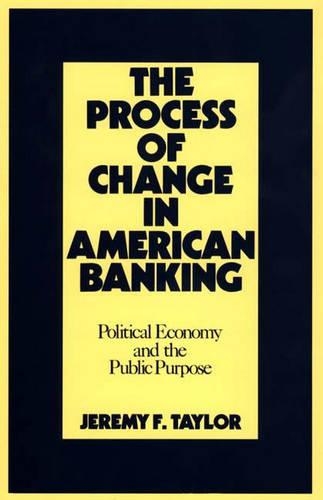
The Process of Change in American Banking: Political Economy and the Public Purpose
(Hardback)
Publishing Details
The Process of Change in American Banking: Political Economy and the Public Purpose
By (Author) Jeremy F. Taylor
By (author) Marilyn Taylor
Bloomsbury Publishing PLC
Praeger Publishers Inc
17th April 1990
United States
Classifications
Tertiary Education
Non Fiction
Banking
332.10973
Physical Properties
Hardback
240
Description
Focuses on the recent changes in the US banking system, analyzing the reasons for them and proposing solutions to problems currently faced by the industry. The author shows the lack of public confidence in banking wrought by such crises as the bailout of the savings and loan industry. He fully examines the current banking crisis against the background of historical changes in US banking, demonstrating that banking change in this country is most often crisis driven - due primarily to the failure of the legislature and the government to solve major problems before they become major crises. The considerable influence of politics on the US banking system is also explored in depth.
Reviews
Jeremy Taylor argues that banking change in the U.S. is most often driven by crises that occur due to lack of timely action by the legislature and government. His three-part treatise begins with a discussion of the process of change in American banking, highlighting the five major bank crises since 1779. A middle section discusses the problems caused by changes in banking, with emphasis on the current savings ad loan situation. Possible solutions are set forth in the last section: the creation of a new financial instrument that would allow investors to share in the ownership of bank loans, the amendment of the Glass-Steagall Act, and the creaton of debt-reduction summits for the major debtor nation of the Third World.-Business Information Alert
Jeremy Taylor offers a progressive, challenging look at the future of banking in the United States. In the face of rapid globalization and the worldwide redistribution of wealth and power, Taylor examines U.S. banking's past and future as a series of critical turning points and highlights the forces at work in the financial community that are accelerating of U.S. banks in the international financial marketplace....In a rather unique attempt to interpret events in banking according to the law of physics, Taylor elegantly proposes a framework for characterizing the history of change in banking that is based on a number of fundamental assumptions....He is making a call to arms for government, finance, and business to discover ways and means to make their diverse goals and objectives mutually supportive.-The Bankers Magazine
"Jeremy Taylor argues that banking change in the U.S. is most often driven by crises that occur due to lack of timely action by the legislature and government. His three-part treatise begins with a discussion of the process of change in American banking, highlighting the five major bank crises since 1779. A middle section discusses the problems caused by changes in banking, with emphasis on the current savings ad loan situation. Possible solutions are set forth in the last section: the creation of a new financial instrument that would allow investors to share in the ownership of bank loans, the amendment of the Glass-Steagall Act, and the creaton of debt-reduction summits for the major debtor nation of the Third World."-Business Information Alert
"Jeremy Taylor offers a progressive, challenging look at the future of banking in the United States. In the face of rapid globalization and the worldwide redistribution of wealth and power, Taylor examines U.S. banking's past and future as a series of critical turning points and highlights the forces at work in the financial community that are accelerating of U.S. banks in the international financial marketplace....In a rather unique attempt to interpret events in banking according to the law of physics, Taylor elegantly proposes a framework for characterizing the history of change in banking that is based on a number of fundamental assumptions....He is making a call to arms for government, finance, and business to discover ways and means to make their diverse goals and objectives mutually supportive."-The Bankers Magazine
Author Bio
JEREMY F. TAYLOR is strategic planning officer at Key Bank of Central New York, Syracuse. His previous book, The Banking System in Troubled Times, was also published by Quorum Books.
